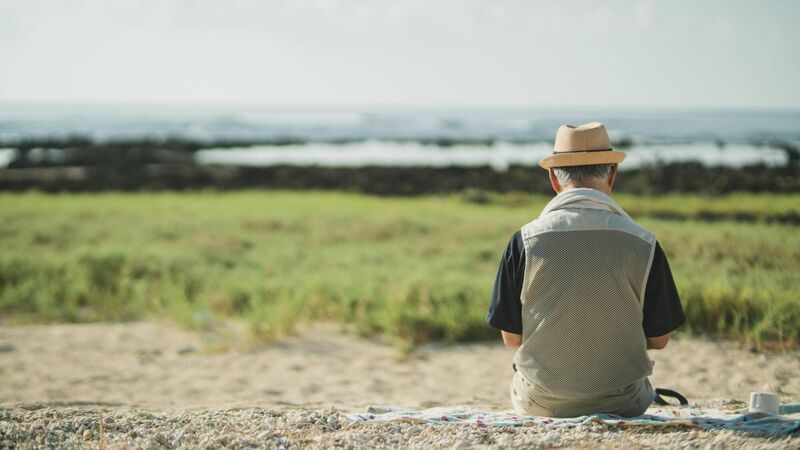Gareth O'Callaghan: We are afraid of getting old because it means becoming invisible

In our youth-obsessed culture in which people are afraid to age, it seems the older you get, the more your importance is diminished.
Franz Kafka once said: “Anyone who keeps the ability to see beauty never grows old.”
I don’t consider myself old, but I’m acutely aware that I am getting older — more so than I was 10 years ago.
Ageing is a fact of life that nothing gets in the way of.
Recently I discovered a new word — gerascophobia, the fear of growing old. Could there really be such a fear?
It appears there is, and has been since each of us first realised that time is the only opponent in life that we’re never going to beat.
In fact, the fear of growing old is so strong, it can impact every aspect of how we live.
According to a 2014 survey by Pfizer, 87% of Americans said they were scared of getting old.
Anxiety about loneliness in old age
Meanwhile 60% of those who took part in a survey in The Guardian said they were worried about loneliness in old age.
In a survey last year of adults in the UK, 62% said that fear of ageing was a significant factor in their lives.
What’s perhaps even more surprising is the level of fear around ageing among those in their 30s and 40s.
That loneliness is caused by a sense of invisibility that more and more people are feeling as they age, and their status in society becomes more diminished.
I met Ted late one evening during the dark uncertain days of covid while we were both wandering along an aisle in a supermarket I had driven across the city to in the hope of finding fresh bread.
I was out of luck. So was Ted, in his search for toilet paper.
The atmosphere in the shop was eerie, and the shelves so unbelievably empty that it reminded him of a food market he had visited in Moscow in 1990.
It was pure coincidence, I told him, that I had been there that same year. So we got talking. It turned out to be the same shop. What were the chances?
I offered Ted a lift, and told him we would keep searching until we both found what we were looking for
Almost two hours later, mission accomplished, I was sitting in his kitchen drinking tea and looking at old photographs of holidays he had taken over the years with his wife, who passed away nine years ago.
“I thought I was the strong one until she was gone. Then I fell apart. Now I just feel invisible to the world, like I don’t exist. It’s like no one sees me anymore,” he said.
“But I get on with my life.” There was a difficult silence.
“Tell me what it feels like to be invisible?” I asked.
“I feel like I’m an outsider, as though I no longer have a role to play in anyone else’s lives. It’s like people can’t see me anymore, even though I’m still here.”
In the weeks and months following this conversation, I gradually started to detect a sense of how he felt.
Despite smiling and nodding to people I passed every day, it struck me that no one appeared to notice me. I thought I was imagining it at first, but I wasn’t.
Fear of ageing in our youth-obsessed culture
In our youth-obsessed culture in which people are afraid to age, it seems the older you get, the more your importance is diminished.
Adverts for anti-ageing products are everywhere, reinforcing the notion that growing older must be avoided at all costs.
The global market for anti-ageing products was worth €62bn last year, which adds up to a lot of people doing their best to ward off the inevitable.
Is it any wonder that older people are feeling more disillusioned about their value?
Recent research however shows that fear of ageing is more closely related to fear of the unknown, and how that fear is only intensified by an ever-widening gap between older and younger generations.
When I was a boy, my favourite time of the week was a visit to my grandparents’ house.
My grandmother adored baking. She could spend entire afternoons making the most scrumptious soda breads and cakes, while showing me how to knead dough, line baking tins, and cut pastry.
Looking back, those afternoons were among the most important and formative of my childhood years
My grandmother, unknown to her, was teaching me about ‘flow states’ — moments when we simply lose ourselves in the joy of something we love doing. We were carried along in the moment.
Until the day she died, she was one of the most important and influential people in my life.
Her older years never once diminished her in my eyes — as it should be. In those flow states we shared, I learned so much about connection.
Since that chance meeting five years ago, Ted’s friendship has shown me both the attractions and the challenges of growing older.
It also reinforces my belief that men don’t talk enough to each other about those challenges.
Life is not meant to diminish us as we grow older, but unfortunately it does — often through no fault of our own.
Why does our society focus so much on youth, while neglecting our elders? Why does this generation no longer acknowledge the wisdom and experience that comes with age?
Respect for the Aged Day in Japan
In Japan, Respect for the Aged Day is a national holiday celebrated on the third Monday of September, when families honour their grandparents and elderly relatives.
Long life is a cause for celebration. Okinawa is known as ‘the island of the immortals’. The local language has no word for ‘retirement’.
Mexican culture also highly values grandparents — its abuelos. They often live with their children and are deeply involved in family life.
Sardinia is no different — the elders are deeply respected for their life experience, and continue to work in the community well into their 90s.
In Greek culture, old age is honoured and celebrated, while families show huge respect for their elders.
Meanwhile, in our Western culture, more and more elders are being relegated to nursing homes because, in many cases, families just can’t be bothered to care for them.
Elderly parents, it seems, don’t fit into this modern culture of entitlement.
Psychologist Erik Erikson argued that this fear of ageing prevents us from living full lives:
Lacking a culturally viable ideal of old age, our civilisation does not really harbour a concept of the whole of life
Ted celebrated his 80th birthday last week. We marked the occasion with a cake and I gave him a gift of a biography of Abraham Lincoln, whom he admires.
What he really would have enjoyed was a visit from “even just one” of his four children. “No doubt, they’re saving their crocodile tears for my funeral,” he quipped.
Ted is no pushover. He’s one of the best conversationalists I have ever met.
Apart from reading, he cooks, paints, plays piano, and goes to a yoga class. He knows all about flow states.
He rubbishes the great myth about getting older, namely the assumption that our memory inevitably declines with old age.
Harvard psychologist Ellen Langer demonstrated many years ago that memory loss can be reversed.
She discovered that forging personal relationships in later life improved memory performance. Fear of ageing is self-sabotaging. It often becomes a self-fulfilling prophecy by causing those fears to come true.
Ted is a gentle soul on a mission. He welcomed me into his life on a night we were both out searching for the bare necessities.
Our weekly chats have made me realise that human contact is also a necessity — possibly the greatest antidote to ageing anxiety.
That said, I can’t imagine Ted getting old. As he says himself, he’s too busy.
CONNECT WITH US TODAY
Be the first to know the latest news and updates
More in this section






